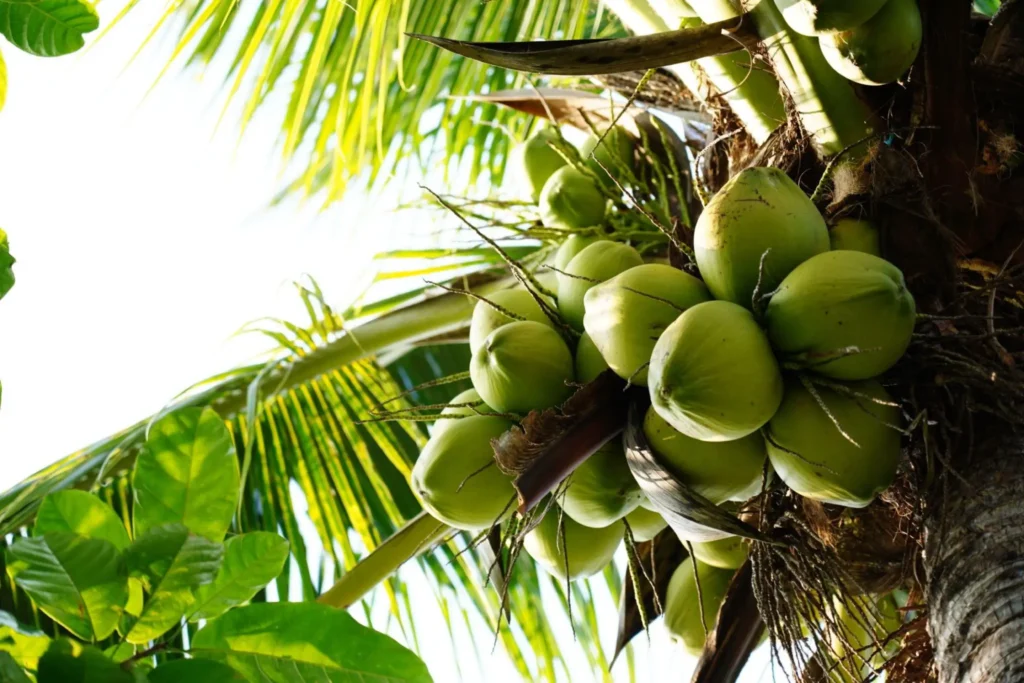Last Updated on 2 years ago by Nicky Johnson
Coconuts are known for their unique shape and taste, but have you ever wondered just how much does a coconut weigh? The weight of a coconut can vary depending on its size and type. These variations in weight are influenced by factors such as the species of the coconut palm and the conditions in which the coconut grows.
It’s worth noting that the weight of a coconut is usually measured when it is still in its husk, which can account for a significant portion of its overall weight.
Despite their varying weights, coconuts continue to be enjoyed for their rich, sweet, and refreshing flavor, whether they are used in culinary dishes or consumed as a beverage.

About Coconut
Blog Contents
Coconut is a fruit of a palm tree or coconut tree native to Malaysia but is now found in parts of Africa, South America, India, Hawaii, the Pacific Islands, and other tropical countries.
Orange Dwarf Coconut, Malayan Dwarf Coconut, Fiji Dwarf, King Coconut, and Macapuno Coconut usually bear fruit at an earlier age.
The largest of the nuts, the average coconut, weighs 1 1/2 pounds (680 grams), and one tree will produce thousands of coconuts over its 70-year lifespan.
You can keep an unopened coconut in the fridge, but it won’t last as long as a coconut left at room temperature.
Coconuts are surrounded by fibrous core, which contains a white flesh called copra. Inside the shell, a thin brown skin protects the liquid. Coconuts are distinct from other fruits by the presence of a large amount of a clear liquid in their endosperm, which is called coconut water or coconut juice.
Properties of coconut
Let’s see a few properties of coconut. Coconuts are well-known for their unique properties. Each coconut variety has its own size and taste.
Firstly, they are packed with nutrients and provide a wide range of health benefits. The coconut water inside the fruit is rich in electrolytes, making it a natural way to stay hydrated. You can store coconut water for 2 weeks.
Additionally, it is low in calories and cholesterol-free, making it suitable for those watching their weight or managing heart health. The flesh of the coconut is high in dietary fiber, promoting good digestion and preventing constipation.
Furthermore, coconut oil, derived from meat, has gained popularity for its numerous uses and health benefits.
It is prized for its high smoke point, making it ideal for cooking at high temperatures. Coconut oil is also rich in medium-chain fatty acids, which are easily absorbed by the body and can increase metabolism. These unique properties make coconuts an excellent addition to a healthy diet and lifestyle.
Uses of Coconut
Coconuts possess a wide range of uses and can be used in a variety of ways. Coconut is also a fruit used for their nutritional coconut milk and cream, which are both refreshing and delicious. Desiccated coconut is used in confections.
King coconut is the sweetest fruit of all. Coconut water, in particular, is a hydrating and nutritious beverage, rich in electrolytes and vitamins, and is often used as a healthy substitute for sugary beverages.
You can enjoy different products made from coconut, such as coconut milk and coconut cream, dried coconut, flaked coconut, and cream of coconut. It is tasteless and unsweetened. You can save the packed coconut for up to 6 months.
Most people consider coconut water as coconut milk, while it is not. You can make coconut milk by cooking equal parts of freshly grated coconut meat and water.
After cooking, strain the mixture, and you will get a thick, rich, creamy white liquid. You can save this coconut milk extracted from the mixture.
The extracted oil, also known as coconut oil, is used for cooking and medical purposes. It is extracted from mature coconut fruit. You can also make coconut jam and coconut gel from the grated coconut meat.
Grated coconut meat can be consumed in various forms, such as raw, minced, or dried, and is a widely used ingredient in many cultures around the world. Sweet coconut is used for eating.
Coconut shells can also be used to create a variety of decorative items, demonstrating the versatility of the fruit beyond its edible uses.
In addition to its culinary uses, coconut oil is increasingly being used in beauty products, such as natural moisturizers, hair conditioners, makeup removers, and oil pulling, which is believed to improve oral health.
The weight of the coconut varies according to their size and type. Let’s see how much does the average coconut weigh.
How much does the average coconut weigh?
The weight of coconuts can depend on a few things, like the type of coconut palm, how old the fruit is, and the conditions in which it grows. A coconut palm can produce 100 coconuts per year, and each one takes 12 months to ripen.
The average weight of a full-sized coconut is about 1.4 kg (3.1 lb), but it can range from 0.9 kg (2 lb) to 2.7 kg (6 lb) for young coconut.
The hard shell of coconuts is what makes them so heavy, and the meat inside is also pretty dense. The water inside a coconut can also vary depending on when it’s mature and if it has an embryo inside.
The average weight of one medium coconut is 1.5 kg.
A single coconut palm can produce 50 – 120 fruits. The largest of these is the coco-de-mer or Seychelles double coconut, which can weigh up to 20 kg. Double coconut is the largest coconut among all types.
They’re usually found in tropical areas, and they’re harvested for a variety of uses, like drinking, cooking, or making oil. Even though coconuts are so heavy, they still have a great feel when you hold them in your hand.
How much grated coconut meat or coconut milk is in the pound of coconut?
The amount of coconut that can be grated or milk depends on the type of coconut and how packed it is. A large ripe coconut can yield about 1 pound of coconut meat or about 5 to 6 cups of grated coconut. If you place the meat in a colander and squeeze it, you can make about ½ cup of undiluted coconut milk.
On average, one pound of coconut will give you around 2 cups of coconut meat or 1.5 cups of coconut milk, but these are just estimates and can vary slightly depending on the coconut and how it’s grated or milked.
Coconut meat is made by shredding fresh coconut flesh and is often used in sweet or savory dishes because of its unique flavor and texture. A big ripe coconut will yield about a pound of coconut meat, which will give you about 5–6 cups of shredded coconut.
How heavy is a coconut with husk?
The weight of the husk of the coconut can depend on the size and maturity of the coconut. Most coconuts with a coconut husk weigh around 2.8-3.5 pounds, or 1.3-1.6 kilograms.
This weight can vary depending on the type of coconut and where it’s grown. To give you an idea of how much coconut with husk you can get, it’s like getting about 2–3 cups of coconut flesh from a single coconut.
Keep in mind that the husk alone can make up 30-40% of the total weight, so if you want to get a lot of coconut flesh, you’ll need to buy a few coconuts or go for the pre-packed coconut flesh that’s usually available at most grocery stores.
Coconuts come in all different shapes and sizes, but the average husk weight for a hybrid variety is 0.80 ± 0.14 kg, and the shell weight is 0.25 ± 0.08 kg, with a total weight of 1.68 ± 0.21 kg. The coconut with husk is heavier than you might expect and can weigh up to 1.7 lbs (0.8kg).
How much does a dry coconut weigh?
The average size of a whole coconut is about 5 inches long and 2.3 ounces in weight. Whole coconuts are mostly sold in grocery stores. The weight of a dry coconut can vary depending on its size and level of moisture.
On average, a fully matured dry coconut has an average weight of 1.30 kg. The weight of the coconut is primarily concentrated in its hard outer shell, which accounts for the majority of its mass.
The average weight of a medium coconut is between 1.5 and 2 pounds (approximately 680 to 907 grams). A full-size coconut typically weighs between 3 and 4 pounds (approximately 1.4 and 1.6 kilograms). However, a coconut can weigh as little as 2.5 pounds (approximately 5.5 kilograms).
Green coconut is used for drinking and snacks, and it has an average weight of about 1.30 kg; it can be 1-2 kg if it is too young.
Conclusion
In conclusion, how much does the average coconut weigh is a typical question. The weight of a coconut can vary depending on its size and type. On average, a mature coconut weighs around 1.4 kilograms or 3 pounds, but it can range from 0.9 kilograms to 2.7 kilograms or 2 to 6 pounds.
The weight of a coconut is primarily determined by the amount of water it contains, with larger coconuts typically having more water content.
Additionally, the weight can be influenced by the type of coconut, as some varieties are naturally heavier than others. It is important to note that the weight mentioned here applies to the whole coconut, including its husk and shell.
When purchasing a coconut for consumption, it is important to choose one that feels heavy for its size, as this indicates it has a higher water content and is more likely to be fresh.







